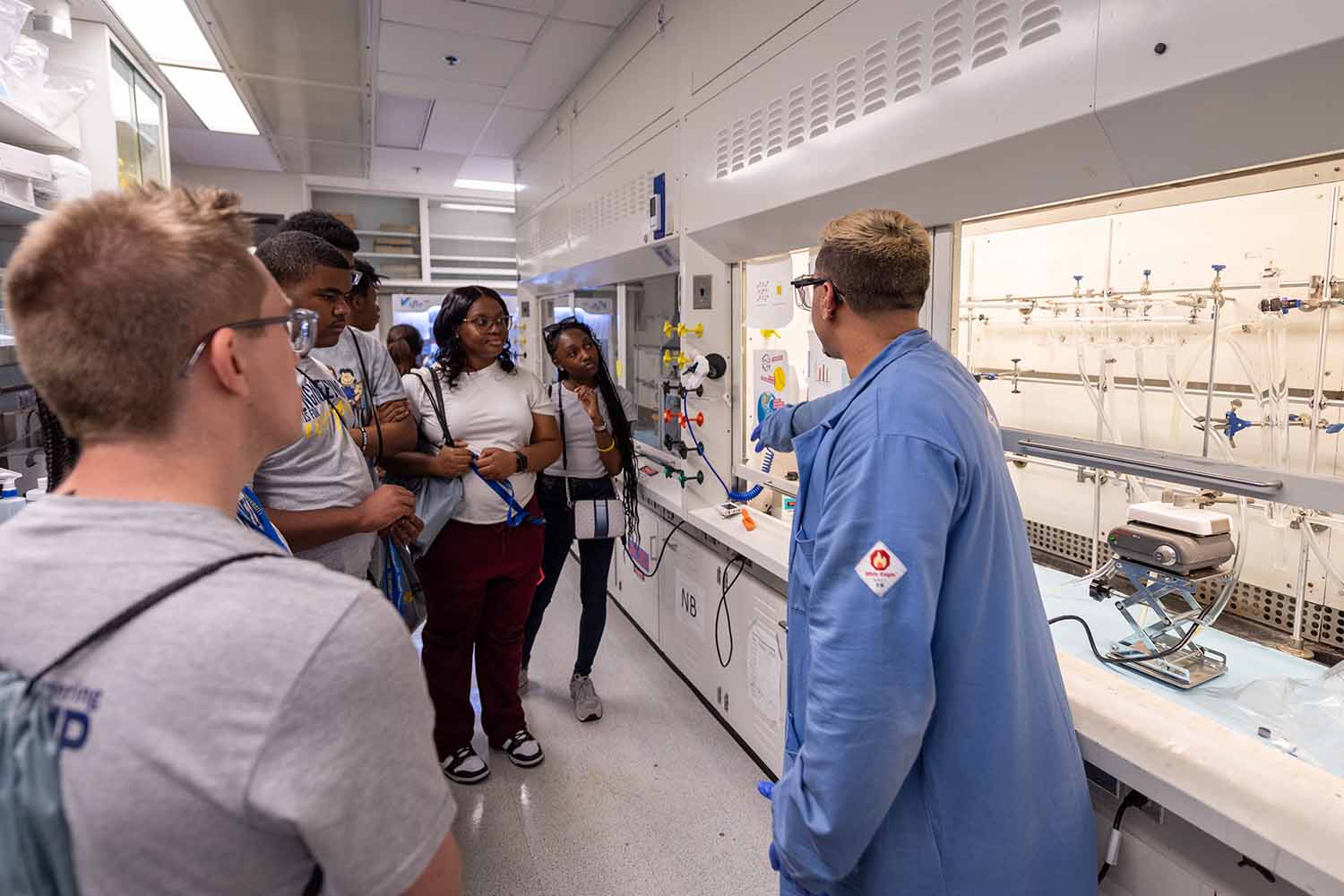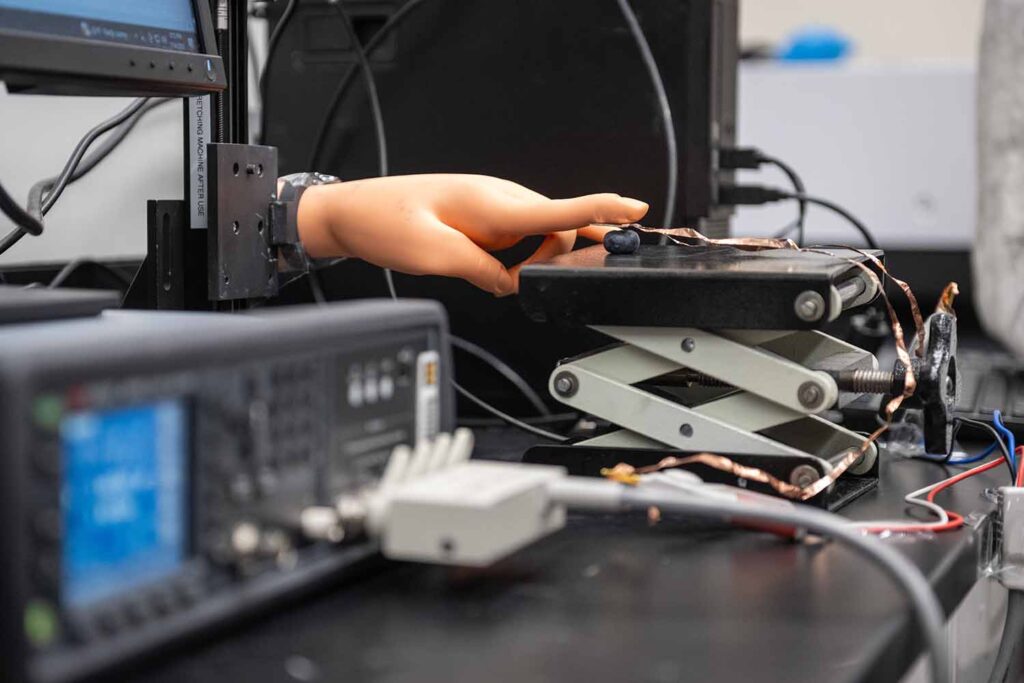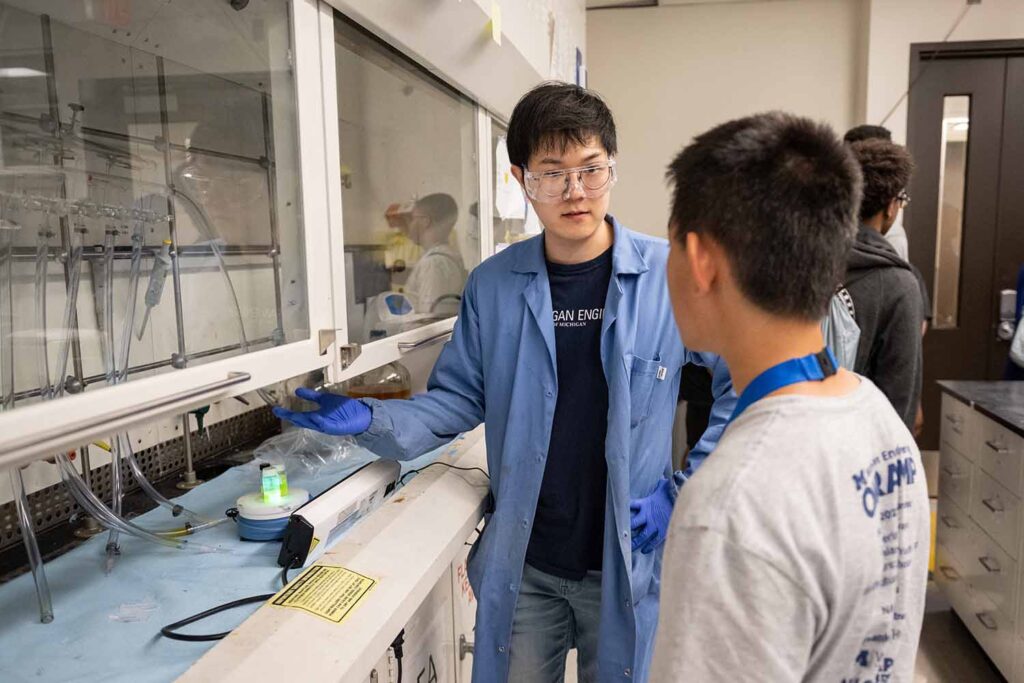
Introducing opportunities for the next generation of STEM scholars
Local high school students learn about pressure sensors, nanotechnology and renewable energy as an introduction to research and engineering.

Local high school students learn about pressure sensors, nanotechnology and renewable energy as an introduction to research and engineering.
A recent collaboration between the Gong Lab and Engineering OnRamp (EO) organized by the Office of Culture, Community and Equity (OCCE) welcomed over 60 high school students from the metro-Detroit area to provide educational opportunities for a diverse group of young individuals interested in engineering. Activities and presentations led by the Gong Lab gave visiting students an introduction to cutting-edge research techniques and experimental activities, covering a range of concepts including wearable sensors, nanotechnology and renewable energy.
“Our team had such fun in these educational activities organized by OCCE! I am deeply impressed by the curiosity and passion towards STEM careers from the attendees,” Chemical Engineering Assistant Professor Xiwen Gong said. “Presenting our research to high school students also encouraged us to think deeper about the work and explore innovative methods to convey complex scientific and technological ideas in the most accessible way.”
In the first mini-research talk, Taylor Dotto, an undergraduate student in Chemical Engineering, presented the development of a bio-inspired and low-cost wearable pressure sensor. She demonstrated how to use the Calathea Zebrina plant to fabricate a soft and wearable pressure sensor. A lab demonstration, led by Chemical Engineering undergraduate student Zhuokai Qu, showcased the practical application of the sensor. With the incorporation of the wearable pressure sensor, an artificial hand can sense a gentle touch on a blueberry and retrieve itself after making contact.

“It was an honor to introduce younger students to what the research experience looks like as an undergraduate researcher,” Qu said. “I was amazed by the interdisciplinary thinking and planning many students had shown envisioning their future careers – incorporating both elements of science and engineering along with social and humanities disciplines.”
Students were also introduced to nanoparticles that emit bright light to demonstrate the chemistry and physics of nanomaterials. Macro PhD pre-candidate Carlos Figueroa Morales and current Chemical Engineering PhD student Sijun Seong demonstrated a synthesis reaction of nanocrystal precursor and anti-solvent which resulted in the liquids turning green or red, indicating synthesis of bright perovskite nanoparticles.

“It was a pleasure to share our passion for material science with curious high school students,” Seong said. “Their genuine eagerness to learn and boundless curiosity were truly inspiring. It was a meaningful event that made me reflect on the importance of communicating our work and nurturing the interest of the next generation of researchers.”
This experiment was captivating for high school students with an interest in STEM, as the experiment is simple and the reaction is instantaneous.
During the event, Joanna Lee, an undergraduate student in Electrical Engineering, and Caroline Brostoloni, a visiting summer intern from Penn State University, along with Taylor Dotto, formed a panel to discuss their on-going research projects and share their experiences as female students in different fields of engineering.
“It was incredible to see the amount of interest in our projects, you could tell the students were really thinking about a future in STEM,” Dotto said. “It was great to talk to them about getting involved in research and the fun and exciting work we’ve been doing.”
Among the visiting students was the group Galaxy Girls+, a partnership with Detroit Area Pre-College Engineering Program (DAPCEP) for students interested in aerospace engineering and space science and the Ford NACME Summer Program, a partnership with the Ford Motor Company and the National Action Council for Minorities in Engineering. Both groups are invited to attend Engineering OnRamp annually to engage in projects that are designed to convey essential skills that lead to success in the engineering field, such as the demonstrations presented by the Gong Lab.
“We hope these activities ignite the curiosity of the visiting students and encourage them to pursue a career in the field of engineering by demonstrating the many possibilities within it,” Gong said.